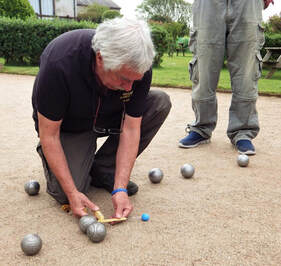 GAME ARE ALL AROUND US. We’re a country, and somewhat a world, where we love to play games. Lots of them. Soccer, baseball, tennis, basketball, chess, cribbage, Monopoly, Minecraft and thousands of others, and yes, even petanque. What would we do without the games we play? Our world would be a far different place, that’s for sure, but we do play games and with them come rules and regulations. With some games the rules come with them, such as Monopoly; the rules are printed on the inside of the box or at least they used to be. For others you either have someone teach them to you, read them on your own or they’re enforced by a program or person. For lots of games you can even refer to Hoyle’s Rules of Games, a popular book that will lay out rules for all sorts of games. Game rules, and those who enforce them, are necessary, whether it’s partially self regulating such as golf or a game like basketball where constant monitoring for infractions are more the norm. Even on the playground or a casual day on the links, we use rules to help us regulate our play to ensure that everyone is playing the game correctly. For some, playing within the rules makes for a more enjoyable game.
Petanque has its rules too. For the most part they’re fairly simple with numerous scenarios accounted for, from unintentional spectator interference to player fouls and the ensuing warning and penalties, both team and individual. Some rules are easy to understand: both feet have to remain in the circle and can’t come off the ground until the boule played has touched the ground. Easy enough to understand. Mark the circle, again easy to understand. Some aren’t so clear. Mark the jack every time the jack is tossed, placed or moved. Who’s responsible for marking it? The rules don’t say anything about that, but if the jack isn’t marked and an umpire is called into the game to measure then a warning may be given. To whom? Again, the rules don’t say. In the FPUSA we have tournament regulations also. Our regulations help tournament director’s manage tournaments from end to end. Who’s eligible to play, length of timed games, how many teams advance to the championship round and numerous other regulations are there to assist, not hinder. The intention with the regulations is to ensure that players have similar experiences regardless of location or format. With the rules and regulations for petanque, lots of volunteers have spent an enormous amount of time thinking and debating about what works and what’s in the best interest of the game. Their work should be respected. No game has perfect rules and regulations. Petanque certainly is no exception. What once worked, like a particular system for running a tournament, might not work any longer. It’s an evolving process. If you don’t know the rules and regulations of petanque, please take the time to read them, they were written for you. Comments are closed.
|




